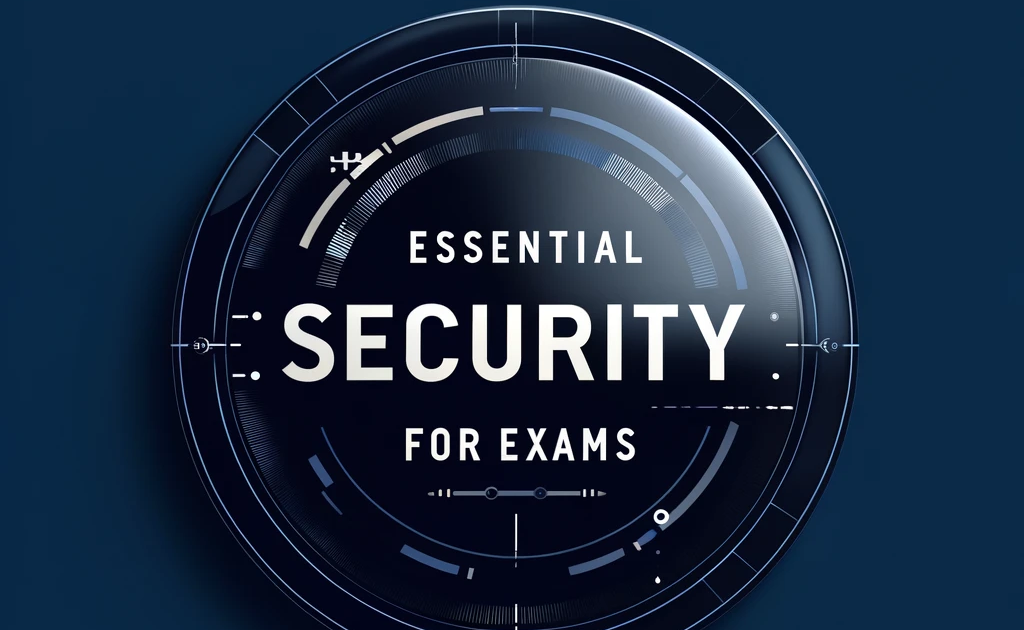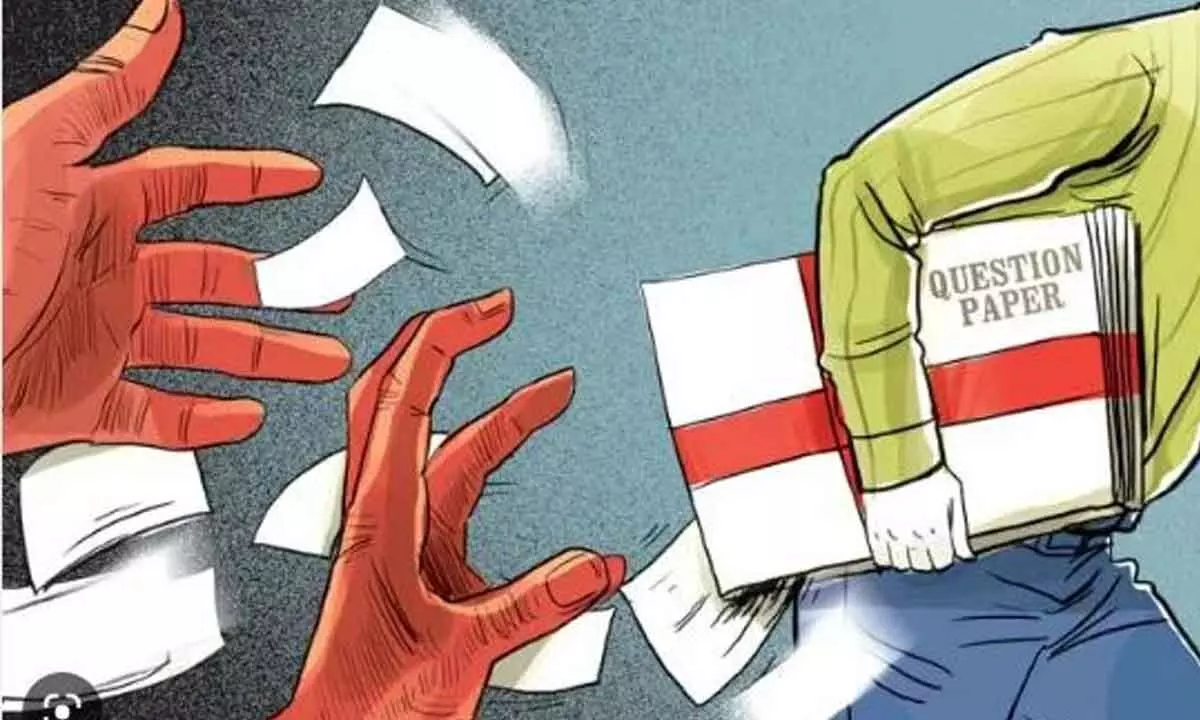Protecting the Fairness in Government Exams with Essential Security
Government examinations in India are known for being extremely competitive. The number of candidates participating in these exams emphasises how important they are in determining career trajectories for many. Therefore, it becomes essential to safeguard the integrity of the examination facilities.
It is crucial to ensure fairness in these examinations by securing them against malpractice. In this context, implementing proper security measures can go a long way towards eliminating mundane and sophisticated copying and cheating. Let's sharpen our focus on some essential measures that can fortify examination centres and validate the integrity of the assessment process.
Strict Entry Protocols
Government examination centres have the responsibility to practice certain entry protocols. Only candidates with proper ID cards should be allowed inside. This will prevent the entry of unauthorised individuals into the examination hall. Mobile phones and other electronics that are banned must also not be allowed inside such premises. This systematic approach can minimise the chance of unchecked interaction between candidates.
Computerised Identity Verification
The implementation of computerised identity verification systems for invigilators enhances the credibility of exam supervision. By verifying the credentials of examiners electronically, institutions can enhance accountability and reduce the likelihood of impersonation or unauthorised access.
Assigned Seating Arrangements
Candidates should be directed to their designated seats in the exam room based on their registration numbers as soon as they enter. This can help maintain order and ensure that the candidates are seated appropriately to prevent any form of collusion during the exam.
Anti-Cheating Technologies
Integrating innovative technologies can help in efficiently identifying and preventing attempts at cheating. Technologies such as secret QR codes, computerised logos, and specialised colour-coding on answer sheets can help in detecting and preventing cheating attempts effectively. These measures improve the authenticity of exam papers and make it harder for candidates to cheat unnoticed.
Maintaining Silence
The examination hall should be a place where everyone must remain silent. This can help minimise distractions and ensure a conducive environment for concentration during the exam duration.
Physical Security Measures
To prevent unauthorised access and guarantee the safety of exam materials, examination venues should be outfitted with sufficient physical security measures. It can include surveillance cameras, security personnel, controlled access points, etc.
Legal Deterrents Against Cheating
Enforcing severe legal penalties, such as imprisonment and hefty fines, for those who engage in cheating activities reinforces the seriousness of integrity violations. The enforcement of penalties serves as a deterrent against cheating and malpractice.
Defined Punishments for Negligence
Clear definitions of punishments for negligence leading to exam leaks are essential. Maintaining confidentiality and closely monitoring the entire exam procedure is imperative for intermediate administrators and printing staff to avoid leaks.
By carefully considering these factors and implementing appropriate security measures, it is possible to conduct examinations at designated and secure exam centres in a way that ensures a fair and secure experience. Service-providing companies like Aptech can play an important role in ensuring that examination centres adhere to these protocols and maintain a secure environment for conducting exams.
For more details:
https://news-aptech.blogspot.c....overnment-exams.html


@7e248e28e
How to Prevent Paper Leaks in Government Examinations
The Indian public examination system has stood as the symbol of integrity and fairness for decades. It has shaped the future of millions of individuals. But in recent times there have been reports of exam papers being leaked at an alarming rate. This has led to not only undermining the sanctity of exams but also decreasing the trust people have in the educational system. To combat this pressing issue and restore faith in the examination process, concerted efforts and innovative strategies are needed.
Here are some ways we can prevent paper leaks in public exams:
Regulatory Restrictions
The introduction of the Public Examinations Bill is a positive step towards prevention. Strict punishments, such as hefty fines and substantial jail sentences, discourage future perpetrators and demonstrate the government’s commitment to maintaining the integrity of the examinations.
Reliable service providers
Trustworthy service providers play an important role in fortifying examination centres and developing reliable systems to prevent breaches. Leaks are channelled through shady intermediary organisations. It is necessary to destroy their malicious networks through increased monitoring and intelligence-collecting tactics.
Responsible Parenting
Some parents have unrealistic expectations and use immoral methods to secure their children’s success. It is important to educate parents on the value of integrity and ethical conduct in education. Encouraging a learning culture and ethical success above rote memorisation can relieve pressure on children and reduce parental participation in paper leaks.
Centralised Examination Servers
Establishing central servers for exams can improve security and accountability. Question papers can be directly delivered electronically to examination centres shortly before the start of exams. This can considerably minimise the danger of leaks during transportation or storage. This strategy has been successful in other fields, such as medical entrance examinations.
Robust Monitoring
Implementing stringent monitoring measures, such as CCTV surveillance and random inspections, might discourage potential perpetrators. Regular audits of examination methods and infrastructure verify compliance with standards. It identifies the risks that need to be addressed immediately.
Maintaining the integrity of government examinations is vital for sustaining the credibility of India’s educational system. While challenges continue to arise, proactive steps and concerted initiatives can reduce the likelihood of exam paper leaks and restore public trust. Service providers such as Aptech, a homegrown Indian brand, that understands the working of the Indian education system and has a strong credibility of over 3 decades can help in building stronger examination systems to avoid breaches. By using technology, establishing tough regulations, and cultivating an integrity culture, we can safeguard the sanctity of examinations, paving the way for a brighter future for India’s youth.
For more details:
https://aptechlimited.wordpres....rnment-examinations/
Why Choosing Aptech is Still a Smart Move
Upskilling is essential to staying ahead of the curve in today’s fast-paced world. Students and professionals strive to build a future that makes them irreplaceable.
That's when Aptech enters the scene.
Aptech partners with you to nurture talent, encourage growth, and develop a generation of talented professionals eager to make a difference in the world. Carrying the legacy of enhancing the lives of over 7.5 million students, Aptech proudly cements itself as a global leader in the landscape of skill development and vocational training.
Diverse Skill Development Verticals
Aptech educates the aspirants on high-demand and job-ready courses in various industries, upskilling them to create a promising career.
Celebrating 25 years of shaping careers, Arena Animation stands as a pioneer in the media and entertainment space. Offering courses that cover animation, VFX, multimedia, gaming, and more, Arena Animation equips students with the skills and knowledge necessary to thrive in the competitive industry landscape.
MAAC is India's one of the leading institutes for high-end 3D animation, visual effects, gaming, and multimedia education. MAAC prepares its students for the demands of the ever-evolving entertainment sector. They ensure that the students receive hands-on experience and exposure to real-world scenarios, setting them apart in the job market.
With Lakmé Academy Powered by Aptech, Aptech Limited brings you the first institute that offers hands-on training for beauty and wellness. Lakmé Academy offers courses in cosmetology, haircare, makeup, nails, and skincare to equip students with the skills and expertise they need to succeed. Through practical training, industry insights, and mentorship from seasoned professionals, Lakmé Academy ensures that graduates are ready to make their mark in the beauty industry.
Tech-Driven Learning Platforms
Aptech goes beyond standard teaching techniques by adding new technology-driven learning platforms to improve the learning experience. OnlineVarsity and Creosouls are two such platforms that have played an important role in enhancing the learning experience.
OnlineVarsity is a content-sharing platform that is successful across boundaries, delivering a worldwide learning experience. It brings together all Aptech training brands in one spot. Whereas, Creosouls serves as an online portfolio showcase and professional social networking platform, facilitating connections and engagement among students, instructors, and industry professionals. It aims to improve the student experience by allowing students to display their work, obtain evaluations and criticism from prominent instructors, and connect with possible employers.
A Gateway to a Bright Future
When you choose Aptech, you are not just picking a non-formal education institution. You are taking an intentional step towards a successful and rewarding career. With a trusted legacy and a dedication to bridging the skill gap, Aptech provides students with the practical skills to succeed in the ever-evolving competitive world. In a world where skills and flexibility are essential, Aptech serves as a lighthouse, guiding students to a future in which they are not just employed but thrive in their chosen industries.
For more details:
https://news-aptech.blogspot.c....till-smart-move.html
Understanding Aptech’s Legacy in Skill Development
These words have been visible in Aptech’s transformative landscape of non-formal education and skill development. Aptech envisions a future where there is an availability of highly- skilled, job-ready workforce to meet challenges in the ever-evolving technological demands across various industries.
A big aspect of Aptech’s objective is to address the vocational training gap in light of India’s economic development projections. With a focus on industries such as IT, media and entertainment, beauty & wellness, aviation & hospitality, Aptech has become a catalyst in preparing youth to stay competitive.
The Significance of Education and Skill Development in India
India aspires to become the world’s third largest economy by 2027 with an estimated CAGR of 8%. Keeping this potential in mind, a focused effort is needed to tap into the nation’s potential with skill development playing a vital role.
The Indian M&E sector grew over 8% in 2023 to reach INR2.3 trillion. This rise highlights how important skill development and education are to the country. With the government’s focus on enhancing digital infrastructure, the sector is undergoing a remarkable transformation, creating more work possibilities.
Aptech Limited’s Role in Nurturing India’s Workforce
Aptech understands the importance of cultivating a skilled workforce to achieve the government’s vision for national prosperity.
The foundation was laid for a revolution in skill-based education with Aptech’s first computer education centre in the late 80s. It was a time when the nation was just beginning to grasp the potential of IT and, the skilled workforce that the industry would require.
The same was repeated with the AVGC segment at the beginning of Arena Animation in 1996. Aptech welcomed creativity by establishing its Animation and Multimedia Institute, recognising the demand for skilled professionals in the fields of animation, VFX, Game Design and so on.
Aptech launched a music video – “Har Ghar, Hunar” to mark India’s 75th Independence Day in 2022. The song, addresses the youth across the country, inviting them to join via vocational training and get the freedom to follow creative pursuits. The company’s intent through the music video was to convey the message that every household in India can prosper if they have the right skill sets to grow in these new age careers where there are lakhs of jobs available.
Every year, Aptech reaches a significant new milestone. These milestones are not just the accomplishment of Aptech, but also the success of countless individuals whose lives are impacted, and whose careers are built by the programs. Today, Aptech proudly stands as a symbol of excellence, providing individuals with the skills to succeed in the twenty-first-century industry.
Building a nation of quality and innovation has always been the mantra of Aptech. With India on track to become a global economic powerhouse, the importance of skill development cannot be undervalued. Carrying a legacy of futuristic approach and promising career placements with the best companies to work for, Aptech continues to shape the economic narrative of India. Let us envision a future in which every individual possesses the necessary skill set to contribute to the nation’s workforce. Let’s build a nation that encourages the growth of skilled individuals.
For more details visit here:
https://aptechlimited.wordpres....n-skill-development/
Bridging the Gap Between Skills and Industry Needs
Technology is changing fast, driving an equally fast-evolving demand for dynamic skillsets in jobs within the industry. This makes it challenging for people to stay relevant without reskilling or upskilling themselves. Both job seekers and employers face the dilemma of adapting to the rapidly changing technological landscape.
So, why do skill gaps occur?
Skill gaps occur when there is a disparity between the skills demanded by evolving industries and those possessed by the available workforce. This gap can arise due to various factors, including inadequate education and training programs, changes in job requirements, or the emergence of entirely new fields.
To close the skill gap, updating and expanding training programs to incorporate emerging technologies and industry trends, providing targeted training and upskilling opportunities for the aspirants and current workforce is a way to go.
With a 37-year legacy, Aptech has been skilling thousands of professionals in various industries across the country. Aptech’s dedication to industry-ready curriculum and employment-driven courses has enabled aspirants to get started on their respective career paths successfully.
The Aptech Advantage
Aptech takes pride in its dedication to imparting both life skills and core technical skills to its students. The six-edge advantage it offers covers crucial areas such as creativity, resilience, teamwork, managing deadlines, presentation skills, and industry interface.
Through this approach, Aptech transforms Qualified Unemployed Graduates (QUGs) into Qualified Employable Professionals (SEPs), contributing to the shaping of the nation’s future.
Aptech is on a mission to offer non-formal education and vocational training to students, professionals, universities, and corporations. They want to become dependable and self-sufficient Indian brand experts. The goal is to establish an ecosystem that provides young people, the training, opportunity, and skills they need to find jobs or pursue self-employment.
Arena: Pioneering AVGC with Aptech Limited
Founded in 1996 by Aptech Limited, Arena Animation is a pioneer, trendsetter, and global leader in animation and non-formal academic curriculum-based training programs. Providing relevant courses and skill sets to prepare students for high-demand employment has had a significant impact on this evolving sector. The curriculum here is customised to meet current industry standards, ensuring that students are well-prepared for the ever-changing world of animation, VFX, and gaming.
MAAC: Career Courses Tailored to Industry Demands
MAAC is India’s leading training institute for high-end 3D animation and visual effects. Founded in 2001 and a major brand of Aptech Limited, MAAC offers industry-relevant career courses in 3D animation, visual effects, gaming, multimedia, filmmaking, broadcast, VR, and AR. MAAC courses are thoughtfully designed to provide students with thorough insights into the dynamics of the industry. It provides a real-life training environment for students, backed by excellent faculty, world-class infrastructure, and the latest technical tools. MAAC students are placed across all domains of the Media & Entertainment industry in India & overseas.
Lakme Academy Powered by Aptech: Commitment to Excellence and Adaptability
Aptech collaborated with Lakmé Lever to set up Lakme Academy to train aspiring artists across India and equip them to start their careers in the beauty and wellness industry. Lakmé Academy powered by Aptech, is present in over 115 locations across the country and offers foundation and advanced-level courses in skin, nail, cosmetology, hair and make-up.
With its world-class events like ‘The Cover Girl’- excelling editorial looks and ‘The Showcase’- runway looks, they learn with live projects. Lakme Academy gives the vision to its students to dream bigger and gives them the exposure to make those dreams come true.
Aptech has effectively enabled students to pursue successful careers by offering industry-relevant curricula. Aptech’s influence spans across industries, including IT, Media & Entertainment (AVGC), Beauty & Wellness, and Aviation, & Hospitality, positively impacting the lives of countless students. As the educational landscape evolves, Aptech Limited serves as an inspiration guiding people along rewarding and diversified professional routes.
For more details:
https://aptechlimited.wordpres....-and-industry-needs/




